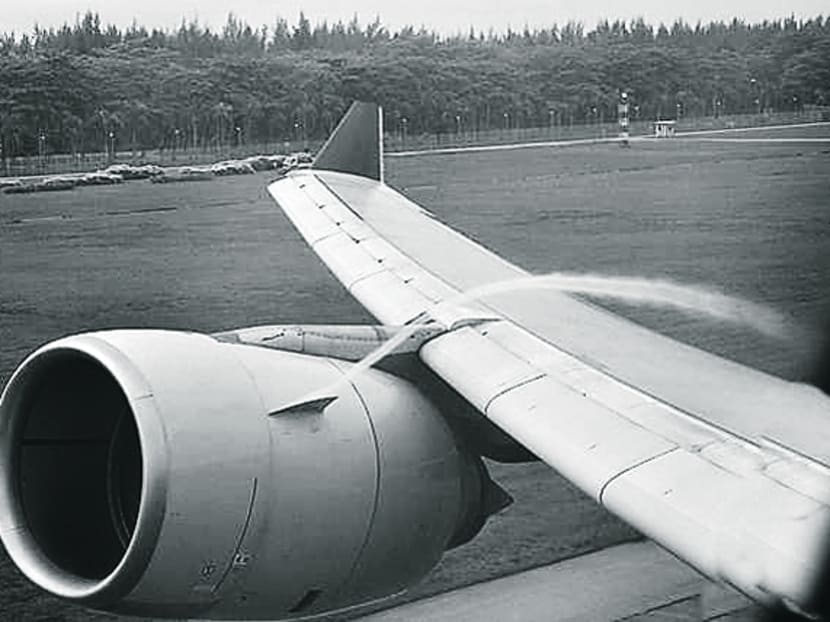Dad’s wisdom made learning part of life
I learn every day. My father provided the motivation for learning with one of his many observations. He told me one day: “I never met a person I could not learn something from if I looked carefully.” I’ve extended this to: “I’ve never seen something I could not learn from.” People and what I see focus my curiosity.

When taking off and landing at Changi Airport, the writer saw this stream of white stuff flowing from the engine and over the wing, and wanted to know what caused it. Photo: C Frank Starmer
I learn every day. My father provided the motivation for learning with one of his many observations. He told me one day: “I never met a person I could not learn something from if I looked carefully.” I’ve extended this to: “I’ve never seen something I could not learn from.” People and what I see focus my curiosity.
A second lesson further strengthened learning: That of anticipation.
On weekends, my father took me on “repair trips” where he had to solve a problem with an elevator controller (he was a self- taught engineer). I was sitting in a corner of the elevator penthouse once and he looked at me and said, aren’t you going to help? I gave him a blank stare — how could a 12-year-old kid help?
So he said, do you know what a helper is? I said, a helper helps, of course, and he replied that that was not much of a definition. His definition: A helper knows what the boss wants before the boss knows what he wants.
This simple statement changed my life — instead of sitting in the corner staring at what he was doing, I turned it into a game.
Could I figure out what he needed before he asked for a specific tool? In order to anticipate, I was forced to understand a bit of what he was doing and how he was going to do it. My goal was to go for an entire problem-solving episode without his asking for something.
I never made it, but in the process of trying to anticipate what he wanted, I asked questions, I became engaged in his troubleshooting and repair strategy. I discovered how to focus my curiosity and use my “whys” to think.
The lesson of anticipation and acting on my anticipation stuck. My father was forgiving as long as I avoided careless anticipation. So, anticipation joined curiosity in driving my daily life.
OBSERVATIONS ON A FLIGHT
We speak of lifelong learning, but if lifelong learning is following a learnt recipe, I personally will follow the recipe only until I lose interest. My motivation comes from my “whys” and, using my dad’s lessons, everywhere I look and every person I meet, I find a “why” and a desire to understand. Consequently, lifelong learning has become part of my day — not something where I stop and say, okay, now let’s learn for one hour.
For example, I’m fortunate to be able to travel to many places and, while I’m travelling, I’m looking at what is happening. In Singapore, the humidity is high almost all the time. When taking off and landing at Changi Airport, I have seen a stream of white stuff flowing from the engine and over the wing. (See photo.)
I noted that the stream started at a piece of metal attached to the engine housing. After the flight, I asked the pilot what that piece of metal was and he called it a “nacelle strake”.
Off I went to Google, and found that this piece of metal starts a vortex (small typhoon) — a rotating tube of air. Because the rotating air travels further than air flowing directly over the wing, it must travel faster and this reduces the pressure within the vortex. Reduced pressure causes moisture to condense, forming a “tube” of condensed water.
I spent probably six months with these pieces in the background of my thinking, watching for more vortices and learning about them. It was fun. The Singapore Airlines pilot was my “professor” and Google was my access to knowledge.
REMOVING THE OBSTACLES
At Duke-NUS Graduate Medical School, I’m building a learning platform: Gateway to Learning (http://duke-nus.org). It is not designed to support classroom activities common to many learning platforms; it is designed to enable learners to view videos, PDF documents, images and stuff from other websites (such as Khan Academy and Bozeman Science) without becoming bogged down in the mechanics of moving from one website to another.
It provides a function for aggregating related stuff — by enabling students to add their other personal stuff, websites they found useful, images that help explain and notes taken while studying.
Gateway is Duke-NUS’ approach to open learning, by creating an environment for it. The design is focused on enabling one to chase his or her curiosity with minimum distractions such as locating and acquiring stuff.
Said another way, the majority of a learner’s energy should be directed at learning, instead of the process of finding the videos, documents and images needed to build one’s personal learning environment. It is about restoring the joy of learning by removing as many obstacles to learning as possible.
ABOUT THE AUTHOR:
C Frank Starmer is Associate Dean of Learning Technologies and Professor, Cardiovascular and Metabolic Disorders Programme, at the Duke-NUS Graduate Medical School.
This is part of a weekly series on the way we learn. To read C Frank Starmer’s previous articles, go to tdy.sg/comstarmer






